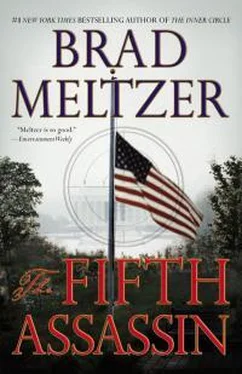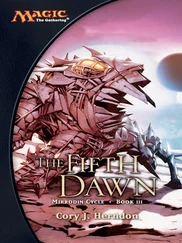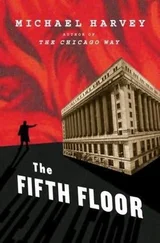Halfway across the bridge, Palmiotti’s still talking, and I’m still holding my breath. My lungs tighten from the lack of oxygen. Blood rushes to my face, which feels like it’s about to burst. But as we pass the midway point and the bridge’s curved metal arches begin their angled descent, I—I—
I look around cautiously. The wheels continue to choom-choom-choom across the bridge’s metal grating. And I still hold tight to the steering wheel. But not as tight as before.
“Beecher, you hear what I just said?”
“Yeah… no… you were talking about the President. That… that he’s not the man you thought he was.”
“You weren’t even listening, were you? What I said was… when we were in seventh grade, Wallace ran for student government treasurer. Not even president. Treasurer. And he got beat. Miserably. The kids hated him back then. Do you understand what that means?”
“It means everyone’s beatable.”
“No. It means people can change, Beecher. Perceptions can change. For bad—or even good—not everyone is who they used to be. Just because something happens in your past, doesn’t mean it defines your future.”
He lets the words sink in as I think about my father, and Clementine, and of course about the President and Palmiotti. But I’m also thinking about Marshall and everything I did to him. So much that can never be undone.
With a final ca-chunk , the wheels of the car leave the metal bridge and I watch it fade behind us.
“But you are right,” Palmiotti says, still staring in the rearview. “Everyone is beatable. Especially when you know where their weak spot is.”
As the road weaves us through the small town of Thurmont, Maryland, and out onto the open road, a slight incline tells me we’re beginning our ascent into the mountain. The next sign we see is a wooden one from the National Park Service.
Welcome to Catoctin Mountain Park
If we head right, to the eastern side, we’ll find public camping grounds, hiking trails, and scenic mountain vistas. Instead, I turn left, toward the western side, where the road narrows even further—down to two thin lanes.
There’s no more open farmland. No more small town. As we weave upward, slowly climbing the mountain, we’re surrounded by steep slopes, rocky terrain, and thick swaths of towering oak, poplar, hickory, and maple trees. We can’t see more than a few feet in any direction.
Still, we both know what’s up ahead, hidden deep within the park. I glance at the car’s digital clock. We still have a half hour.
“We’ll make it,” Palmiotti says. “But whatever happens from here on out, no more blaming yourself. What matters is you tried, right?”
Of course he’s right. But that’s exactly why I can’t stop thinking about that night in the basement. I know who Marshall used to be. I know what I did to him. And in less than a half hour, I’m about to come face-to-face with exactly what I turned him into.
91
Eighteen years ago
Sagamore, Wisconsin
It’s dark down there.”
“He’ll be fine,” Timothy Lusk said from his wheelchair, rolling to the edge of the steps and looking down, down, down into the dim basement. “You’ll be good, right, Marsh?”
Holding the pushbars of his father’s wheelchair and peeking over his father’s shoulder, young Marshall took his own look down the unfinished stairs with the rusted metal treads. The black basement floor seemed to sway and move with a life of its own.
“I can get you a flashlight,” Pastor Riis’s wife—a woman everyone called Cricket—said.
“If you want, I can go,” Pastor Riis added.
“He’ll be fine,” Marshall’s father said. “It’s just water.”
Pushing his glasses up on his face, Marshall stepped backward, which sent a small, inch-high tidal wave flowing back through the kitchen. It was just water. And thanks to a cracked drainpipe that kept the pastor’s dishwasher running during the entire weekend they were gone, it was everywhere: in the kitchen… in the living room… and, with some help from gravity, in the basement, which now looked like a dark black cesspool. When Marshall and his dad first arrived, Pastor Riis said it was knee-high down there. That meant even deeper for Marshall.
“Here… here’s a flashlight,” the pastor’s wife said, handing the light to Marshall, who shined its beams down the steps, though it barely penetrated the dark.
“Don’t worry, we’ll be right here,” his father said, pivoting his wheelchair and motioning Marshall forward.
Before Marshall could argue, a flashbulb went off, and his father’s Polaroid vrrr ed, spitting out an instant image.
“Don’t forget—you need this,” his father said, handing Marshall the camera. “Get pics of everything.”
Marshall nodded. For six months now, since his dad had been hired as an insurance adjuster, that was the job: take photos, document the damage, write up the report.
Of course, Marshall knew his dad got the job as a favor—even insurance companies feel bad for an unemployed guy in a wheelchair. But as the company quickly found out, so did claimants, who had a tough time complaining about how bad their damage was when they were talking to a double amputee who would never walk again.
“I told him not to run the dishwasher before we left. Didn’t I tell you that, dear?” the pastor’s wife asked, putting a hand on Riis’s shoulder. Quickly catching herself, she glanced at her guests and added, “I’m sorry—I didn’t mean to snap at my husband like that.”
“You call that snapping ?” Timothy laughed, motioning his son to the edge of the steps. “They should come to our house, right, Marsh?”
Staring down into the darkness, Marshall didn’t even hear the question. Over the past six months, he didn’t mind being dragged along with his dad. In fact, he liked it. There was something nice about being alone in the car with your father as the radio played and the wind whipped through your hair. Plus, when there were places his dad couldn’t go—when the accident happened on the second floor of a house and there was no stair-lift, for instance—Marshall was the perfect assistant, grabbing the Polaroid and using the climbing skills he got from the treehouse to scurry up into attics or even out onto roofs. It didn’t just make him feel good. It made him feel useful. Special.
But even twelve-year-olds know… attics and roofs are very different than a dark basement.
“If he’s scared, I really don’t mind going,” Pastor Riis said for the fourth time.
“He’s not scared. He loves the dark, right, Marsh?” his dad insisted, rolling his wheelchair forward, using the empty footplate to give Marshall one last shove.
Aiming the flashlight at the stairs, Marshall took his first step down.
“There you go. Toldja he liked the dark,” his dad added.
For Marshall, this was about far more than just the dark. For years now, he’d heard the gossip about Pastor Riis. Two years ago, Bobby McNamera used to take a private Bible class that Riis used to teach in this basement. Soon after, Bobby abruptly moved away without saying goodbye, never to be heard from again. Every kid in seventh grade knew: Don’t go down into the pastor’s basement.
“Just be careful,” the pastor’s wife called out as Marshall took a few more steps down, the damp air clogging his nose. No doubt, the water was high, covering at least five steps from the bottom. Tucking the flashlight under his armpit and holding the camera over his head, he aimed and shot. A flashbulb popped and a quick photo popped out. He didn’t even bother looking at it.
As he took another step down, his foot was swallowed by icy water, which filled his sneakers and made a sponge of his socks. With another step, the water was over his ankles, then up to his calf, his knee, his thigh. By the time he reached the final step, holding the camera even higher above his head like an army grunt trudging through a river, the water covered his thighs, skimming the edge of his testicles. It was freezing, but Marshall was sweating.
Читать дальше











